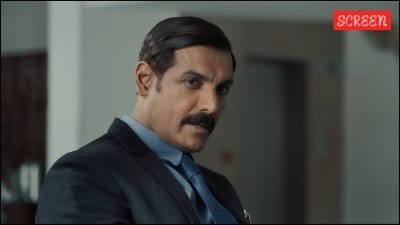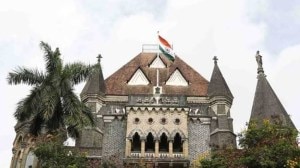Missing The Beat
FIFTY years ago, rock 8217;n8217; roll hit the world. You8217;d know that by now, of course, unless the Limp Bizkit on your stereo has dr...

FIFTY years ago, rock 8217;n8217; roll hit the world. You8217;d know that by now, of course, unless the Limp Bizkit on your stereo has drowned out the news. And while we8217;ve recently been deluged by the history, the present, the future and how far Indian rock has come, one side of the story remains untold: Where has the original rock 8217;n8217; roll music8212;Chuck Berry, Fats Domino, Jerry Lee Lewis, Little Richard8212;disappeared to in India?
Where do you go if you want to hear the soundtrack to the story of James Dean and Marlon Brando, the sounds of the 8217;50s and early 8217;60s? The answer: Homeward bound, because there are precious few bars, pubs and theatres that cater to you.
First things first. Why the hankering after rock 8217;n8217; roll music? What was so special about it? Why the fuss, why can8217;t we simply be happy with the 8216;8216;classic rock8217;8217; that almost every pub plays, the songs of the Eagles, Led Zeppelin, even Glen Campbell? Well, rock 8217;n8217; roll RNR is different. 8216;8216;It was the first cultural phenomenon that was about young people, that was for young people and controlled by young people, made by young people8217;8217;, Salman Rushdie, who has close associations with the genre, once said. 8216;8216;And your mother didn8217;t like it. Certainly my mother didn8217;t like it8217;8217;.
It was raw, it was powerful, it was all about sex and young lust and growing up. And that was just the lyrics. There was a beat that was hard to miss, an energy that got you going. 8216;8216;It8217;s the backbeat that gets you,8217;8217; says Anjum Katyal, who8217;s been singing the songs for a quarter century in Kolkata. 8216;8216;There8217;s nothing else to make you want to get up and start dancing. Even teenagers who listen to Trance get on the floor when we play RNR.8217;8217;
RNR means enough to Katyal that, every few months, she sheds her serious NGO persona, gets up on stage and delivers a rendition of Janis Joplin8217;s Me and Bobbie McGee that bears an eerie resemblance to the original. She8217;s lucky because she can still get to do it in Kolkata, where RNR continues to rule.
And in the city, the best place to hear the music is at Someplace Else, the pub at The Park that has acquired near-legendary status for its promotion of live music, usually at the cost of profits. The pub has live shows six nights a week but Wednesdays and Fridays are special: That8217;s when Hip Pocket are on, a band whose repertoire is 40 per cent RNR and whose drummer, Nondon Bagchi lives, smokes and breathes the music.
|
ROCKING TONIGHT
|
|||||
|
Here8217;s where you can still hear rock 8217;n8217; roll |
|||||
Abhijit Bose, now at the Park Group8217;s hotel in Chennai, began the shows when he was in Kolkata. 8216;8216;It began in 1997, it wasn8217;t planned. Nondon was doing restaurant reviews, he came to the pub and we started chatting. That8217;s when the idea took shape to give the pub a classic rock profile, to bring this kind of music back to the city, which was at the time in a slump.8217;8217;
You8217;d think Mumbai, with its cosmopolitan culture and musical tradition would be the place to hear some good old RNR. Not so, says singer Sharon Prabhakar, wistfully. 8216;8216;The only place left in Mumbai for music like this is Not Just Jazz By The Bay NJJBTB at Churchgate. After Rang Bhavan has been shut down, live shows have really taken a beating.8217;8217; So that8217;s where she performs, once every two months, with a set list that includes 8216;8216;a huge dollop of rock 8217;n8217; roll: Blue Suede Shoes, Rock Around The Clock, Hound Dog.8217;8217;
NJJBTB also hosts Gary Lawyer, but this veteran rocker has another outlet: corporate shows for the Indo-American Chamber of Commerce, HSBC, ITC and Hero Honda, among others. 8216;8216;The audience is mostly guys who grew up on rock 8217;n8217; roll, so they love the music and the response is rocking,8217;8217; Lawyer says.
Which brings us to Delhi, where the scene is bleak. Live shows at pubs and bars are virtually non-existent, though the bar at Turquoise Cottage in South Delhi does have the odd show. And Usha Uthup 8212;yes, Usha of the giant bindi8212;can command a full house whenever she8217;s in town with a show that has some golden oldies. This, despite the presence of a large RNR fan base. Ask Bagchi why Hip Pocket don8217;t carry out the apparently simple task of performing a couple of live shows in the capital and he replies fast enough: 8216;8216;We need to play where the beer is cheap and the women are safe. We don8217;t want to be hassled by side issues.8217;8217; Point made: RNR is essentially proletariat music, as it has always been.
8216;8216;They have these Elvis Presley festivals every year where, if you close your eyes, you can imagine you8217;re at Graceland,8217;8217; says Arjun Sen, who left Shillong for New Delhi 20 years ago. Sen was part of the Shillong band Great Society, a group of near-mythical proportions whose founder Lou Majaw started the annual Dylan tributes, still performs every year at Someplace Else, and is generally reckoned to be the single most influential person in that form of music.
Currently, Sen has teamed up with ex-Kolkatan, bassist Lew Hilt who tells the story of Shillong8217;s 8216;Felix8217; Presley and his 30 cassettes8212;8216;8216;not CDs8217;8217;8212;all by Elvis Presley, all part of Felix8217;s repertoire. Hilt has his own theory of why the north-east is so musical. 8216;8216;It8217;s the church, the choirs, which teach you how to sing at a very early age. You don8217;t have to teach these guys harmonies, they can teach you parts you didn8217;t know existed.8217;8217;
That8217;s still just a handful of places8212;and scattered far and wide8212;to hear your favourite music if you8217;re an RNR fan. Why is it on the wane? 8216;8216;It8217;s the media which doesn8217;t take up the cause,8217;8217; says Lawyer. 8216;8216;It8217;s not played on TV stations or radio. People are victims of what they are fed by the 8216;authorities8217; like the media and record companies.8217;8217;
Youth does have something to do with it, says Sen, but in a different vein. 8216;8216;Most bands don8217;t play RNR today because they don8217;t know the language of rock 8217;n8217; roll. They8217;ve been schooled in the chords and bars of 8217;70s-8217;80s rock; the phrases, the sequences of rock 8217;n8217; roll music are different. They just don8217;t know it.8217;8217;
Sen, though, doesn8217;t appear too upset at RNR8217;s fadeaway from the music scene. 8216;8216;You need to grow as a musician8217;8217;, he says with a philosophical shrug. 8216;8216;I love doing Rolling Stones numbers but not more than, say, three to four times a year. The rest of the time I need to do my own creations. Otherwise why are we musicians?8217;8217;
With his wizened face and gravelly voice, Lew Hilt speaks from years of experience. 8216;8216;Music grows, it evolves, it moves on8230; eventually, it comes full circle. You had RNR, rock, disco, punk, then DJs became the stars. Now it8217;s back to the musicians. That8217;s the way it is.8217;8217;
Bagchi, for whom the song I Don8217;t Want To Hang Up My Rock 8217;N8217; Roll Shoes was probably written, says the music, once the soundtrack to riots and rebellion, is played by a more laid-back kind of group for a laid-back kind of people. 8216;8216;The people who don8217;t want record contracts and the people who don8217;t want the cutting-edge music.8217;8217; There8217;s no good and bad in this, it seems, it8217;s just the laws of musical nature.
Back in the politically volatile early 1970s, Bianca Jagger once criticised her husband8217;s songs for their lack of a social message. Mick Jagger8217;s response was a song with this simple message: It8217;s only rock 8217;n8217; roll but I like it.
With in Mumbai
- 01
- 02
- 03
- 04
- 05































